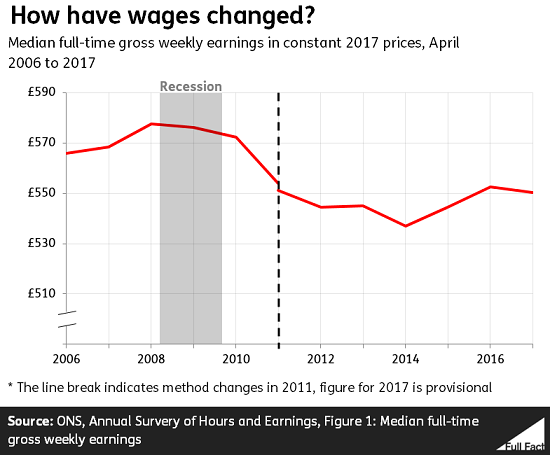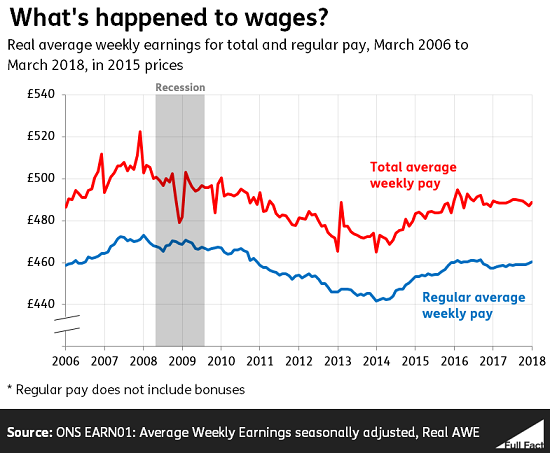What was claimed
Wages are lower today than they were 10 years ago.
Our verdict
Correct, on several measures weekly wages are lower than they were 10 years ago.
What was claimed
Wages are lower today than they were 10 years ago.
Our verdict
Correct, on several measures weekly wages are lower than they were 10 years ago.
What was claimed
Real wages are rising.
Our verdict
Average weekly earnings before bonus payments were higher in March 2018 (and in January-March) than they were in the same periods in 2017. After bonus payments they were either lower or had not changed.
“May I congratulate the Prime Minister on…a record of wages lower today than they were 10 years ago?”
Jeremy Corbyn, 16 May 2018
“And as my honourable Friend says, the news that real wages are up means more money in people’s pockets under the Conservatives.”
Theresa May, 16 May 2018
It’s correct that wages are lower than they were ten years ago once you adjust for inflation. Wages have also risen slightly since last year on some measures if you don’t include bonus payments, but including bonuses they have either stayed the same or fallen depending on how you measure them.
Join 72,547 people who trust us to check the facts
Subscribe to get weekly updates on politics, immigration, health and more.
Real wages take into account inflation, so show how much purchasing power your pay packet has in a way that’s comparable to previous years.
In April 2017 the median weekly wage for full-time employees was lower than it was a decade ago, at £550. The figure was just under £570 in 2007—once you account for inflation. These figures are the headline measure used by the Office for National Statistics (ONS) and come from an annual UK survey that samples 180,000 jobs from HMRC’s PAYE system.
The ONS say that “caution should be taken” when comparing figures over this time period as the way the figures were collected changed in 2011.
The median is the number ‘in the middle’ of a set—so half of all median weekly wages are higher than this, and half are lower.
Real wages fell during the recession and continued to do so until 2014.

We’ve looked more at what’s happened to wages across the last ten years here.
More recent data is available for average wages (though it is less detailed) and longer term they show a similar pattern.
These average weekly earnings come from a monthly survey sampling 9,000 employers and give the average amount paid per person to employees in Great Britain, before tax and any other pay deductions.
Average weekly earnings excluding bonus payments—and taking into account the way prices have changed—increased by 0.4% comparing the first three months of 2018 with the same period in 2017.
Once bonus payments are included, average weekly earnings didn’t grow at all in the first three months of 2018 compared to the first three months of 2017.
Looking only at March 2018 compared to March 2017, average weekly earnings before bonus payments increased by 0.7%, but including bonuses fell by 0.1%.

Rising or falling average earnings don't mean that everybody's or even most people's wages are rising or falling. The average wage is affected by who is working too. Well-paid people leaving work and less well-paid people starting work would reduce the average wage even if nobody in the country had a change in pay.
Full Fact fights for good, reliable information in the media, online, and in politics.
Bad information ruins lives. It promotes hate, damages people’s health, and hurts democracy. You deserve better.